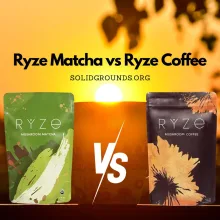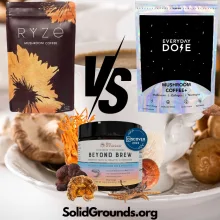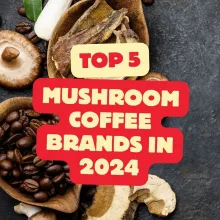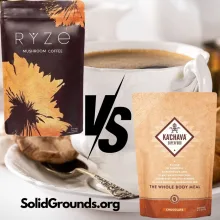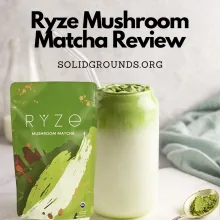Beyond Brew VS Ryze | Solid Grounds
We are comparing the two popular mushroom coffee alternatives: Beyond Brew and Ryze. Both products blend adaptogenic mushrooms with potential health benefits, targeting consumers seeking healthier coffee alternatives. Beyond Brew offers a coffee-free, low-caffeine option with prebiotics and probiotics, emphasizing gut health and sustained energy. Ryze combines mushrooms with organic coffee, promising reduced caffeine content and balanced energy.
The products differ in taste, with Beyond Brew featuring a Peruvian cacao flavor and Ryze aiming for a more traditional coffee experience. Pricing favors Ryze, which offers a more competitive rate per serving compared to Beyond Brew. Ryze also offers additional value through free shipping and accessories. Both brands claim benefits such as improved focus, stress relief, and immune support. The choice between them ultimately depends on individual preferences regarding caffeine content, taste, and specific health goals.
Beyond Brew VS Ryze Comparison Table
 Beyond Brew vs Ryze |  Beyond Brew |  Ryze |
Ingredients and Formulation | (Likely to use natural, plant-based ingredients and functional mushroom extracts) | (Potentially using synthetic caffeine and artificial flavors/sweeteners) |
Taste and Flavor Profile | (Likely to have a more subtle, natural flavor profile) | (Potentially bolder, more intense flavors) |
Health and Wellness Focus | (Likely to promote functional benefits of mushroom extracts) | (Primarily focused on energy boost, less emphasis on overall wellness) |
Sustainability and Ethical Practices | (Likely to use eco-friendly packaging and ethical sourcing) | (Ryze may not have a strong emphasis on sustainability or ethical sourcing) |
Branding and Marketing | (Emphasizing clean labels, sustainability, and health-conscious positioning) | (Aggressive marketing, appealing to a mainstream audience) |
Pricing and Value | (Potentially higher pricing due to premium positioning) | (Likely to be more affordable, targeting mainstream consumers) |
User Reviews and Feedback | (Positive reviews from health-conscious consumers expected) | (Mixed reviews, some praising affordability, others criticizing ingredients) Rating: 7/10 |
Overall Rating | Overall Rating: 8.3/10 | Overall Rating: 7/10 |
Latest Price |

Beyond Brew vs Ryze: A Comprehensive Comparison of Mushroom Coffee Alternatives
In recent years, the functional beverage market has seen a surge in popularity for mushroom coffee, a innovative blend that combines the energy-boosting properties of coffee with the health benefits of adaptogenic mushrooms. As consumers increasingly seek healthier alternatives to traditional coffee, two brands have emerged as frontrunners in this space: Beyond Brew and Ryze. This article provides a detailed comparison of these two mushroom coffee alternatives, exploring their ingredients, health benefits, taste profiles, and overall brand philosophies.
The Rise of Mushroom Coffee
Mushroom coffee has gained traction among health-conscious consumers looking to enhance their daily coffee ritual with additional wellness benefits. By incorporating adaptogenic mushrooms, these beverages aim to provide sustained energy, improved focus, and immune support while mitigating some of the negative side effects associated with high caffeine consumption.
Company Overviews
Beyond Brew, a product line from Live Conscious, positions itself as a health-focused brand offering superfood blends. Their mushroom coffee alternative emphasizes gut health and sustained energy, targeting consumers looking to reduce caffeine intake without sacrificing productivity and focus.
Ryze, on the other hand, was born from the personal journey of its founders, Andrée and Rashad. Former coffee enthusiasts themselves, they sought to create a healthier alternative to their high-caffeine habits. Ryze embodies a philosophy of balanced energy and holistic well-being, extending beyond just their coffee product to include mindfulness practices.
Ingredient Comparison
Both Beyond Brew and Ryze utilize a blend of adaptogenic mushrooms, but their approaches differ significantly. Beyond Brew incorporates six organic mushroom extracts into a coffee-free formula, supplemented with prebiotics and probiotics for gut health support. In contrast, Ryze combines six specific mushroom varieties (Cordyceps, Lion’s Mane, Reishi, Shiitake, Turkey Tail, and King Trumpet) with organic Arabica coffee, MCT oil, and coconut milk.
The mushroom blends in both products offer a range of potential health benefits. Beyond Brew emphasizes immune support, antioxidant properties, and sustained energy. Ryze provides more detailed information on each mushroom’s benefits, such as Cordyceps for energy, Reishi for stress relief, and Lion’s Mane for focus.
Caffeine Content and Energy
A key differentiator between the two products is their approach to caffeine. Beyond Brew positions itself as a low-caffeine alternative, suitable for those looking to significantly reduce or eliminate their caffeine intake. Ryze, while containing coffee, claims to have less than half the caffeine of regular coffee, aiming to provide energy without the jitters or crashes often associated with high caffeine consumption.
Taste Profiles
Taste is a crucial factor for many consumers transitioning from traditional coffee. Beyond Brew offers a Peruvian cacao flavor, described as decadent and indulgent. This unique flavor profile may appeal to those who enjoy a rich, chocolatey taste but want to move away from coffee. Ryze, maintaining a more coffee-like experience, characterizes their blend as smooth, creamy, and delicious, designed to appeal to coffee lovers while providing the benefits of mushrooms.
Health Benefits and Effects
Both brands make similar claims regarding the health benefits of their products, focusing on energy, focus, stress relief, gut health, and immune support. Beyond Brew emphasizes its ability to provide energizing effects without over-stimulation, promoting mental stamina and focus. The inclusion of prebiotics and probiotics in their formula places significant emphasis on gut health and microbiome support.
Ryze promises “calmer energy” and “sharper focus,” highlighting a balanced approach to cognitive enhancement. They specifically mention stress relief through the inclusion of Reishi mushroom and digestive support from Turkey Tail mushroom. Both products claim immune-boosting properties due to their mushroom content and highlight the antioxidant properties of their ingredients.
Adrenal Health
An interesting point of comparison is the brands’ approach to adrenal health. Beyond Brew positions itself as a solution to avoid the adrenal burden often associated with high caffeine consumption. Ryze, while containing some caffeine, emphasizes a more balanced approach to energy that doesn’t overtax the adrenal system.
Marketing and Branding
Both brands target health-conscious consumers seeking alternatives to traditional coffee, but their messaging differs slightly. Beyond Brew focuses on the “superfood” aspect, promoting a “harmonious habit” for body and mind. Ryze emphasizes healing and balance, with their slogan “heal your body & mind” reflecting a holistic approach to wellness.
Ryze offers a unique selling point with their mindfulness app and SMS journal service, extending their brand beyond just the coffee product to support overall mental well-being. This additional service demonstrates a commitment to customer education and holistic health that goes beyond the beverage itself.
Pricing and Packaging
As of the latest available information, Beyond Brew is priced at $37.99 for 30 servings (7 oz), with a per-ounce cost of $5.43. Unfortunately, pricing information for Ryze was not provided, making a direct cost comparison challenging. This lack of information highlights the importance for consumers to research current pricing when making a purchasing decision.
Customer Experience
Customer reviews for Beyond Brew mention positive experiences with taste, though some disagreement exists. Customers report gentle energy boosts, improved focus, and digestive benefits. However, some expressed concerns about value for money, suggesting this could be a point of comparison with Ryze if pricing information were available.
Ryze describes their product as smooth and delicious, but specific customer feedback was not provided in the available information. They claim similar benefits to Beyond Brew, but without customer testimonials, it’s difficult to verify these claims independently.
Corporate Social Responsibility
Ryze demonstrates a commitment to social impact by donating 1% of profits to teaching mindfulness in schools, partnering with the nonprofit organization Mindfulness First. This initiative extends their brand values beyond their product. Information about Beyond Brew’s corporate social responsibility initiatives was not provided, making it difficult to compare the brands on this aspect.
Potential Downsides
While both products offer potential benefits, it’s important to consider possible downsides. The effectiveness of mushroom coffee can vary from person to person, and some individuals may not experience the claimed benefits. Additionally, the taste of mushroom coffee, particularly for those used to traditional coffee, may require an adjustment period.
For Beyond Brew, the complete lack of caffeine might be challenging for those accustomed to the energy boost from regular coffee. The higher price point compared to traditional coffee might also be a barrier for some consumers.
Ryze, while offering a more coffee-like experience, still contains caffeine, which may not be suitable for those looking to eliminate caffeine entirely. The lack of transparent pricing information also makes it difficult for consumers to make an informed decision based on value for money.
Conclusion
Choosing between Beyond Brew and Ryze ultimately depends on individual preferences and health goals. Beyond Brew may appeal more to those looking to eliminate caffeine entirely and prioritize gut health, while Ryze might be preferred by those wanting a more coffee-like experience with reduced caffeine and a focus on overall wellness.
Both brands offer unique blends of adaptogenic mushrooms with promises of enhanced focus, energy, and overall well-being. However, consumers should approach these products with realistic expectations, understanding that individual results may vary. As with any dietary change, it’s advisable to consult with a healthcare professional before incorporating these products into your routine, especially for those with pre-existing health conditions or taking medications.
In the evolving landscape of functional beverages, Beyond Brew and Ryze represent innovative approaches to combining the familiar comfort of coffee with the potential health benefits of mushrooms. As research in this area continues to grow, these products may play an increasing role in promoting holistic health and well-being for consumers seeking alternatives to traditional coffee.
 |  |
FAQs and Answers
Which product is better for someone trying to reduce their caffeine intake?
Beyond Brew would be the better choice for someone trying to reduce their caffeine intake. Here’s why:
- Beyond Brew is described as a “low-caffeine alternative” that is “suitable for those looking to significantly reduce or eliminate their caffeine intake.”
- The article states that Beyond Brew positions itself as a solution to avoid the adrenal burden often associated with high caffeine consumption.
- Beyond Brew is referred to as a “coffee-free formula,” which suggests it contains no caffeine from coffee.
In contrast, Ryze still contains caffeine, albeit less than regular coffee:
- Ryze is described as having “less than half the caffeine of regular coffee.”
- It still contains organic Arabica coffee as one of its ingredients.
While Ryze does offer a reduced caffeine option compared to regular coffee, Beyond Brew appears to be the better choice for those looking to significantly reduce or completely eliminate their caffeine intake. However, the article does note that the complete lack of caffeine in Beyond Brew might be challenging for those accustomed to the energy boost from regular coffee, so this is something individuals would need to consider based on their personal goals and preferences.
How do the prices of Beyond Brew and Ryze compare?
Beyond Brew:
- $37.99 for 30 servings
- $1.27 per serving
- $5.43 per ounce
Ryze:
- $27 (total price not specified in your information, but we can infer it’s likely for a similar quantity)
- $0.90 per serving
Based on this comparison:
- Ryze is less expensive per serving than Beyond Brew.
- Ryze costs $0.90 per serving
- Beyond Brew costs $1.27 per serving
- The difference is $0.37 per serving, with Ryze being about 29% cheaper per serving.
- We don’t have the total volume or weight for Ryze, so we can’t compare the per-ounce cost.
It’s important to note that while Ryze appears to be more affordable, price is just one factor to consider. The products differ in their ingredients, caffeine content, and overall approach to providing energy and health benefits. Consumers would need to weigh these factors along with the price difference to determine which product offers the best value for their specific needs and preferences.
Also, keep in mind that prices can change over time, so it’s always a good idea to verify current pricing when making a purchase decision.
Which product offers better support for gut health?
Beyond Brew appears to offer more explicit support for gut health. Here’s why:
- Ingredient focus:
Beyond Brew’s formula specifically includes prebiotics and probiotics for gut health support. The article states, “Beyond Brew incorporates six organic mushroom extracts into a coffee-free formula, supplemented with prebiotics and probiotics for gut health support.” - Emphasis on gut health:
The article mentions that Beyond Brew “emphasizes gut health and sustained energy” in its product positioning. - Customer feedback:
In the customer experience section, it’s noted that Beyond Brew customers report “digestive benefits” among other positive effects. - Health claims:
When discussing health benefits, the article specifically mentions that “Beyond Brew emphasizes its ability to provide energizing effects without over-stimulation, promoting mental stamina and focus. The inclusion of prebiotics and probiotics in their formula places significant emphasis on gut health and microbiome support.”
In contrast, for Ryze:
- The article doesn’t mention any specific gut health ingredients like prebiotics or probiotics.
- There is a brief mention that Ryze claims “digestive support from Turkey Tail mushroom,” but this is not elaborated upon to the same extent as Beyond Brew’s gut health focus.
Given this information, Beyond Brew seems to place a stronger emphasis on gut health in its formulation and marketing. However, it’s important to note that both products contain mushrooms, which can have potential benefits for gut health. The article doesn’t provide a comprehensive comparison of all potential gut health benefits, so consumers interested in this aspect might want to research further or consult with a healthcare professional for more detailed information.
Are there any additional services offered by either brand?
Ryze offers additional services beyond just their mushroom coffee product. Specifically:
- Mindfulness App: Ryze provides a mindfulness app as part of their offerings.
- SMS Journal Service: They also offer an SMS journal service to their customers.
The article states: “Ryze offers a unique selling point with their mindfulness app and SMS journal service, extending their brand beyond just the coffee product to support overall mental well-being.”
This is highlighted as a distinguishing feature for Ryze, with the article noting: “This additional service demonstrates a commitment to customer education and holistic health that goes beyond the beverage itself.”
For Beyond Brew, the article does not mention any additional services beyond their mushroom coffee alternative product.
This difference in offerings reflects the brands’ slightly different approaches:
- Ryze seems to emphasize a more holistic approach to wellness, extending beyond just the beverage to include mental well-being support.
- Beyond Brew, based on the information provided, appears to focus more specifically on their superfood blend product without mentioned additional services.
This additional offering from Ryze aligns with their described brand philosophy of balanced energy and holistic well-being, as mentioned in the article.
How do the taste profiles of Beyond Brew and Ryze differ?
The taste profiles of Beyond Brew and Ryze differ significantly. Here’s a breakdown of their taste profiles:
Beyond Brew:
- Offers a Peruvian cacao flavor
- Described as “decadent and indulgent”
- Has a unique flavor profile that may appeal to those who enjoy a rich, chocolatey taste
- Designed for those who want to move away from coffee
Ryze:
- Maintains a more coffee-like experience
- Characterized as “smooth, creamy, and delicious”
- Designed to appeal to coffee lovers while providing the benefits of mushrooms
The key differences are:
- Flavor base: Beyond Brew uses a cacao (chocolate) base, while Ryze maintains a coffee-like flavor.
- Target audience: Beyond Brew seems to cater to those looking for an alternative taste to coffee, while Ryze aims to satisfy those who still want a coffee-like experience.
- Taste description: Beyond Brew is described with more indulgent terms (decadent, rich), while Ryze is described in terms that suggest a milder, smoother taste.

